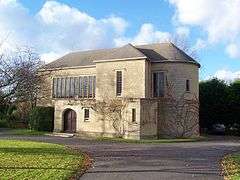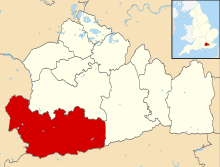Chiddingfold
Chiddingfold is a village and civil parish in the Weald in the Waverley district of Surrey, England. It lies on the A283 road between Milford and Petworth. The parish includes the hamlets of Ansteadbrook, High Street Green and Combe Common.
| Chiddingfold | |
|---|---|
Village green | |
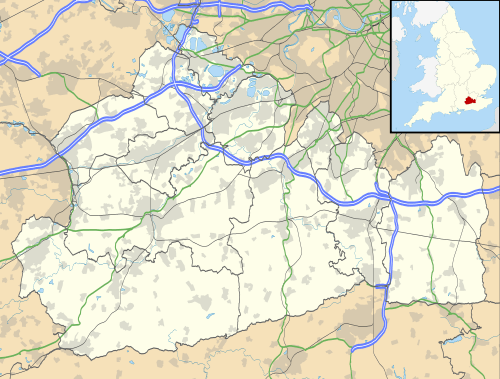 Chiddingfold Location within Surrey | |
| Area | 28.18 km2 (10.88 sq mi) |
| Population | 2,960 (Civil Parish 2011)[1] |
| • Density | 105/km2 (270/sq mi) |
| OS grid reference | SU961355 |
| Civil parish |
|
| District |
|
| Shire county | |
| Region | |
| Country | England |
| Sovereign state | United Kingdom |
| Post town | Godalming |
| Postcode district | GU8 |
| Dialling code | 01428 |
| Police | Surrey |
| Fire | Surrey |
| Ambulance | South East Coast |
| UK Parliament | |
Chiddingfold Forest, a Site of Special Scientific Interest, lies mostly within its boundaries.
History
The name of Chiddingfold "Chadynge's fold", "Chiddingefoulde", is derived from the Saxon, probably meaning the fold (enclosure for animals) "in the hollow".[2]
Chiddingfold became famous for its glass-making. During the reign of Elizabeth I, there were no fewer than eleven glass works on the green. Chiddingfold broad sheet glass was used in some of the finest buildings in the land, including St Stephen's Chapel, Westminster, and St George's Chapel, Windsor.
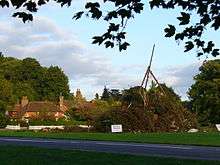
The Guy Fawkes festivities saw in 1887 the village policeman's house attacked by a mob – he was later transferred elsewhere – he may have set the fire early or failed to prevent it from being lit before time.[3] The event of 1929 faced wider unrest, culminating a week later with talk of ducking innocent Sgt Brake into the pond being stalled by 200 Surrey officers using specially requisitioned buses; the village pubs were ordered to close and a JP was on hand to read the Riot Act should it have proved necessary.[4]
There was, from a date in the 19th century until the early 20th century, a tile and brickworks, extracting and processing the clay underlying the parish.[5]
Chiddingfold has an archive which shows the history of Chiddingfold and the previous owners of Chiddingfold houses.
Amenities
The Crown Inn
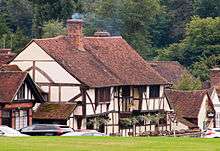
The Crown Inn is one of the oldest inns in England. Built as a rest house for Cistercian monks on their pilgrimage from Winchester to the shrine of Thomas Becket in Canterbury, it claims to have been established in 1285 with the earliest recorded reference to the present building dated 1383; probably when the alehouse (the Halle) expanded to include accommodation, thus becoming an inn. Subsequently, it merged with the adjoining alehouse through common ownership. The Crown has seen many distinguished visitors down the years. In 1552, Edward VI, the "boy king", attended by high officials of state, courtiers, peers and some 4000 men encamped on the village green. It is reputed that in 1591 his elder sister, Queen Elizabeth I, "sojourned there for refreshment" en route from Loseley Park to Cowdray Park: her expense roll for the journey showing two shillings being paid for a tonne of wine to be transported to the village from Ripley.[3][4]
Other
A church (St Mary's), pond, shops and houses lie on three sides of the village green, with the forge on it. Almost half of the land is forested, matching its location within Anglo Saxon England, within The Weald.[3]

The Chiddingfold Scout Group is very active with about 100 boys and girls as Beavers, Cubs and Scouts.
Chiddingfold Cricket Club has active 1st and second teams that compete in the aianson league and always welcome to new members. The club has an active junior section. Children in School years 1 to 6 train on a Friday evening throughout the summer term, with around 100 participating each week. Friday training has become an important social occasion aiding anyone in need of a drink and a burger at the end of the week. Older children train on Wednesday evening and winter training runs for all ages between Christmas and the start of the cricket season. The junior club actively competes in the Berkley Sport Two Counties League at every age group. The club's website has information on how to register.
Chiddingfold has a substantial doctors' surgery.[6]
Events
The village is known for its torchlit procession, bonfire and fireworks display on the Saturday evening closest to 5 November (Guy Fawkes Day). A village festival is also held every year on the village green on the 2nd Sunday in June.
Hamlets
Ansteadbrook
| Wikimedia Commons has media related to Ansteadbrook. |
This minute southern settlement has a brook of the same name that rises just 2 miles (3.2 km) west at the larger hamlet of Almshouse Common in Haslemere civil parish and passes Lythe Hill Farm and Hotel, (architecturally in the second highest category), Grade II* listed[7] above where further springs add to the flow on both sides of the brook.
In the hamlet itself Petworth Road, a road east from Haslemere forms a junction with Killinghurst Lane that leads towards Chiddingfold, where all the cottages are yet there are a remarkable line of four listed buildings for such a tiny settlement further along Petworth Road near the border with West Sussex are Benham's Stud Farm and its Barn,[8] Huntingfords[9] and Cherry Tree Cottage.[10]
Highstreet Green
This hamlet also lies on a small connecting road in a very wooded area starting 1 mile (1.6 km) southeast of Chiddingfold, at its centre is Dunsfold Ryse Farm and typical of the area, a Grade II listed, timber framed, 16th century house, Quince Cottage.[11]
Combe Common
At the western fringe of the village centre is this common which plays host to events in the summer, and which residents of nearby roads sometimes include as their locality.[12]
Religion
The Saint Teresa of Avila Catholic Church dates from 1959.[13]
Media links
The rock band The Stranglers, then called The Guildford Stranglers, were based in Chiddingfold during their key formative period in the mid seventies, sometimes using the name "The Chiddingfold Chokers" and frequenting The Crown Inn.[4] The rock band Genesis built their studio The Farm in the parish in the early 1980s; they also rehearsed at the Chiddingfold Ex-Servicemen's Club and side-project Mike + The Mechanics shot the video for their 1995 hit, "Over My Shoulder", on the village cricket green.
Chiddingfold is referred to in a Mr. Cholmondley-Warner sketch from Harry Enfield's TV series, in which a newsreel – supposedly from 1940 – looks forward to "life in 1990" and predicts that the United States would have come back under British rule, with New York City renaming itself "Chiddingfold-on-Sea".
Demography and housing
| Output area | Detached | Semi-detached | Terraced | Flats and apartments | Caravans/temporary/mobile homes | shared between households[1] |
|---|---|---|---|---|---|---|
| (Civil Parish) | 511 | 429 | 92 | 87 | 0 | 0 |
The average level of accommodation in the region composed of detached houses was 28%, the average that was apartments was 22.6%.
| Output area | Population | Households | % Owned outright | % Owned with a loan | hectares[1] |
|---|---|---|---|---|---|
| (Civil Parish) | 2,960 | 1,119 | 37.2% | 39.4% | 2,818 |
The proportion of households in the civil parish who owned their home outright compares to the regional average of 35.1%. The proportion who owned their home with a loan compares to the regional average of 32.5%. The remaining % is made up of rented dwellings (plus a negligible % of households living rent-free).
Notable residents
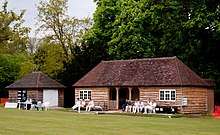
The economist and ecological writer David Fleming was born in Chiddingfold in 1940, to Gold Dagger award-winning crime writer Joan Margaret Fleming.[14]
Socialite Viva Seton Montgomerie spent her final years in the village, until her death in 1959.
The French-born abstract artist François Lanzi lived in Chiddingfold from 1971 until his death in 1988.[15]
Further reading
- Alan Bott The Parish Church of Saint Mary, Chiddingfold 2009 Available from the church
- David Graham and Audrey Graham, with a contribution by Phil Jones "Recent investigations on the site of the Roman buildings at White Beech, Chiddingfold" Surrey Archaeological Collections, 96, 175–189, 2011
References
- Key Statistics; Quick Statistics: Population Density United Kingdom Census 2011 Office for National Statistics Retrieved 21 November 2013
- St Mary's Church history
- White, H.R.H. 1986 Chiddingfold: The Village and History of The Parish Church of St. Mary]
- The Chiddingfold Archive
- H.E. Malden, ed. (1911). "Parishes: Chiddingfold". A History of the County of Surrey: Volume 3. Institute of Historical Research. Retrieved 2 December 2013.
- Chiddingfold doctors' surgery
- Lythe Hill Hotel Historic England. "Details from listed building database (1277848)". National Heritage List for England. Retrieved 10 October 2012.
- Benham's Stud Farm: Historic England. "Details from listed building database (1044591)". National Heritage List for England. Retrieved 10 October 2012.
Benham's Stud Barn: Historic England. "Details from listed building database (1378297)". National Heritage List for England. Retrieved 10 October 2012. - HuntingfordsHistoric England. "Details from listed building database (1044592)". National Heritage List for England. Retrieved 10 October 2012.
- Cherry Tree CottageHistoric England. "Details from listed building database (1378298)". National Heritage List for England. Retrieved 10 October 2012.
- Quince CottageHistoric England. "Details from listed building database (1277933)". National Heritage List for England. Retrieved 10 October 2012.
- Chiddingfold Parish Council – events
- David Fleming obituary in The Times
- "The Self-Absorbed". francoislanzi.com. Retrieved 19 March 2015.
External links
| Wikimedia Commons has media related to Chiddingfold. |
- Chiddingfold Village official website
- Chiddingfold Archive
- Stained Glass Windows at St. Mary, Chiddingfold, Surrey
- Stained Glass Windows at St. Teresa (RC), Chiddingfold, Surrey
- Surrey County Council. "Chiddingfold". Exploring Surrey's Past. Retrieved 31 May 2017.
